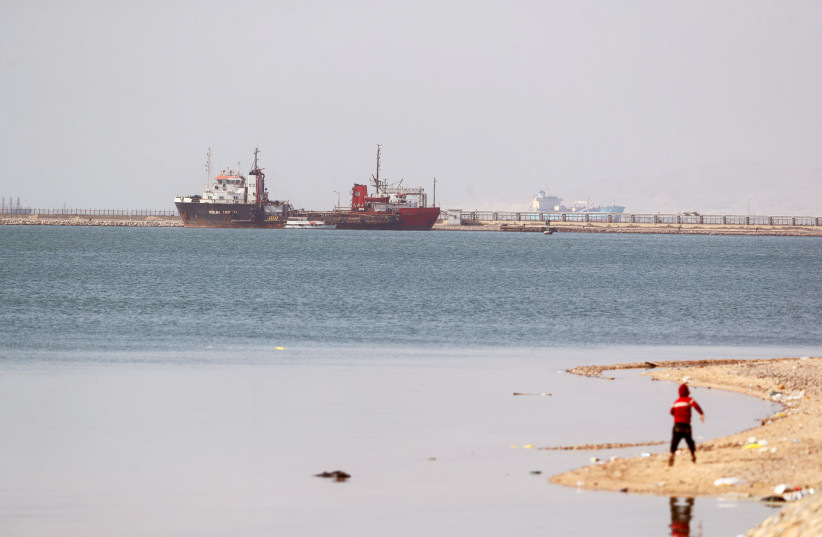In light of the constant Houthi attacks on commercial vessels sailing near Yemen’s coasts, several shipping companies have announced in recent days that they will halt their ship flow through the Suez Canal until sailing in the Red Sea is safe again.
For more stories from The Media Line go to themedialine.org
If this domino-like trend continues, Egypt could face massive foreign currency income losses and devaluation of its currency. Furthermore, if the situation continues for long enough, alternative trade routes could become more frequented.
Since the beginning of the Israel-Hamas war on October 7, the Houthi militia in Yemen has been actively participating by constantly launching rocket and drone attacks against Israel. As part of its offensive, the Houthis have also attacked several commercial vessels sailing close to its coasts in the Red Sea, even those ships that have no link to Israel.
The impact of the Houthi attacks
As a result of the Houthi attacks, several large shipping companies recently announced that they would avoid using the Suez Canal.
Oil giant BP announced on Monday that it would stop its oil transports via the Suez Canal. MSC, the world’s biggest container shipping line, and French shipping group CMA CGM both announced on Saturday. Additionally, Denmark’s A.P. Moller-Maersk stated the same on Friday, and Hapag Lloyd, a German container line, said it might do the same.
Jack Kennedy, associate director and head of the MENA Country Risk Desk at S&P Global Market Intelligence, told The Media Line that the total revenues of the Suez Canal in 2023 were $9.3 billion, and if all shipping lines would decide to halt their usage of the Canal, the Egyptian government would lose approximately $13 million per day.
“The main issue here is that the transit fees are a significant source of dollar revenue for the Egyptian government,” he said, stressing that this is one of the most pressing upcoming issues for the North African state to address in 2024: how Cairo will service its extensive foreign debt.
Kennedy adds that the long-term consequences of sustained insecurity for commercial vessels to reach the Suez Canal could foment the creation and permanent use of alternative transit routes.
“The Egyptian government is likely very concerned by reported plans to establish a logistics and trade corridor from India, via the UAE, Saudi, and Jordan, to the Mediterranean via Israel,” Kennedy said. Noting that this plan is not new, he emphasized that such a trade route, if established, would inevitably reduce transits through the Suez Canal.
“A sustained period of disruption and security risk in the Red Sea approach to the Suez Canal will probably make such projects more attractive to potential member states and investors, if no less vulnerable to disruption from missile or UAV attack,” he continued.
Kennedy noted that the Biden Administration had been putting political capital on this plan before the October 7 attacks and that statements from Hamas suggest that disruption to this plan, a facet of wider normalization with Israel, was a geopolitical motivator.
Egypt’s Suez Canal Authority’s chairman, Osama Rabie, said on Sunday during a statement that his country is closely monitoring the flow of vessels in the Red Sea. The statement came after four shipping companies announced that they would avoid using the Suez Canal until the Red Sea is safe again.

Rabie mentioned that since Nov. 19, only 55 vessels have rerouted via the Cape of Good Hope route and compared it with 2,128 ships that passed through the Suez Canal in that same period. However, since this statement was issued, more shipping companies have joined the halt of ship flow through the Suez Canal for the time being.
A global issue
Dr. Noha Bakr, an advisory board member of the Egyptian Center of Strategic Studies, warned that this is not only Egypt’s problem. She said that if the vessel traffic through the Red Sea and the Suez Canal halts partially or totally, it will have a great effect on global trade.
Bakr told The Media Line that such a halt can put further pressure on several world economies, affecting global supply chains and fuel security since the Suez Canal is a vital corridor for global trade. That is why she believes that the Houthi threat to the security of the Red Sea should be addressed by the international community.
The route from the Persian Gulf to Northern Europe is about 13,000 miles if a ship sails around Africa, which takes some 24 days. If the ship uses the Suez Canal, the trip is reduced to some 7,400 miles, which takes about 14 days. Such a difference in shipping time represents a huge delay in the supply of the transported goods, which could impact their availability and therefore their price.
Kennedy said that according to industry estimates, transits of the Suez Canal account for around 12% of global trade and 30% of global container traffic.
“Our data shows shipments from Asia and the Gulf to Europe or MENA by sea, which predominantly travel via the Suez Canal, represent 14.8% of global trade and 69% of all imports to Europe or MENA from Asia and the Gulf states,” he said.
He believes that it is likely that the Egyptian government will be coordinating with the United States to establish a broader maritime coalition to solve this insecurity problem in the Red Sea.
As for the Houthi motivation to attack vessels that are not linked to Israel, Kennedy believes that there is a geopolitical agenda behind it. “The Houthi—and by extension their main military backer Iran—are probably using their strike capability in the Red Sea to further exercise greater geopolitical influence in the region and on Israel’s war in Gaza,” he said.
